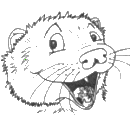On The C'ouch' - Why Does Scuttle Bite The Judge?
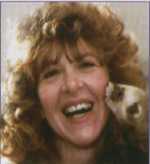 DR JUNE McNICHOLAS, a senior psychologist and expert on animal behaviour, opens her case notes for Ferrets First readers. In her third clinical analysis she focuses on Scuttle the judge biter. He belongs to the editor Jenny Loweth who would often like to disown her embarrassing 'offspring'.
DR JUNE McNICHOLAS, a senior psychologist and expert on animal behaviour, opens her case notes for Ferrets First readers. In her third clinical analysis she focuses on Scuttle the judge biter. He belongs to the editor Jenny Loweth who would often like to disown her embarrassing 'offspring'.
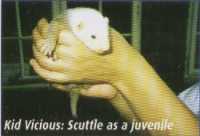
|
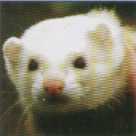
|
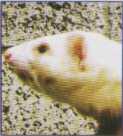
|
Scuttle refuse to co-operate with this analysis unless he was allowed to use the pseudonym 'Cuddles'. After consulting our legal team, Ferrets First decide to name and shame him. He is pictured (centre and right) after his arrest for GBH on North Notts Ferret Club chairman Richard Jessop. This disgraceful incident finally put an end to Scuttle's showing career.
To see Scuttle lying in Jenny's arms, you'd think he was a perfect pet ferret. Show-winning good looks, gentle and affectionate - so why is he a problem?
Quite simply, his love and affection is reserved for Jenny alone. In anyone else's hands he assumes an entirely different character. Sweet nature and docility fly out of the window and he is transformed into an uncooperative psychotic, hell-bent on inflicting GBH, often with unfortunate success. His tally of victims has reached impressive proportions and every puncture tells a story.
1st VICTIM: PETER LOWETH"It seems only yesterday that Scuttle joined the family. Not much larger than adult mice, he and his brother Mousefield proved within the first hour that their ability to inflict pain was completely out of proportion to their size. Mousefield grew into a more-or-less normally behaved ferret but Scuttle remained my Public Enemy No 1. He climbs the mesh of his exercise run to get at me, he pursues me round the garden, he makes a dash for me if I'm helping out at feeding time - and always with a psychopathic glint in black, beady eyes. |
My first session with Scuttle took place at a show. I thought it best to see him in action, so to speak. The fact that his reputation was well established was borne out by the various comments from fellow exhibitors, expressing concern that Scuttle was there without the presence of a mobile Intensive Care Unit.
However, Scuttle appeared perfectly calm, even benign. He showed no aggression, no fear or any sign of being disturbed in any way. He allowed me to hold him, stroke him, tickle him and even lay him on his back in my arms. Nothing. He just blinked sweetly up at me.
But I was not fooled. Many of the worst cases (animal and human) are masters of deceit when being clinically assessed. They deliberately cover their evil tendencies and true nature with benevolent bonhomie. Apparently Crippen and Christie were totally charming. But I could wait - true nature always eventually reveals itself with or without psychiatric help.
In this case the help came from Peter who gallantly volunteered to demonstrate how Scuttle would try to bite him. 'Try' was not quite what Scuttle had in mind, he was more focused on 'succeed' - and he did. I had a perfect view of Scuttle's abrupt change of mood and his malicious attack.
For the second session, I visited Scuttle at home. Once again, he was perfectly willing to be calm and cooperative with me, cunning little devil he is! By now though, I'd gathered a lot of information about him and his behaviour so he was wasting his time on this little pantomime of pleasantness. So what is Scuttle's problem and is there any hope of a solution?
2nd VICTIM: STEVE KIRK - cared for Scuttle while Jenny was away."When I went into the ferret shed, Scuttle bared his teeth and leapt up on all fours. He came from nowhere, shot straight at me, sank his teeth into my hand and locked on. When I got him off, I seized a sweeping brush to keep him away from my toes as I was wearing sandals. I was hopping about while Angela, my partner, was laughing. The ferrets live in two sheds, joined by a small doorway cut in the breeze blocks. I learned to rattle one door and quickly put a brick across the hole to wall the ferrets in while I cleaned them out. One day Scuttle got wise to this and hid in the hutch so that I had bricked him in with me"! |
At the risk of reinforcing everyone's idea of psychiatrists and their obsession with early childhood fixations, breast feeding and potty training, I questioned Jenny about Scuttle's early kithood. He and his brother had been bought as very young kits. Although described as eight weeks, Jenny now believes they may have been very much younger. Kits under the age of eight to ten weeks are still very dependent on their mothers. They may be feeding very well independently but this the time of emotional development for many young animals, indeed, it is seen as a critical stage in puppies and many animal behaviourists point to early separation from the mother as underlying many behavioural problems in dogs, such as nervousness, separation anxiety and fear induced aggression.
In Scuttle's case, his young age at leaving his mum may have made him extra dependent on Jenny. Of course this is very appealing in animals, we all love to feel loved. So Scuttle's dependency would have been rewarded by affection and attention, making him more dependent. In turn, this dependency on Jenny would have led to Scuttle feeling insecure with anyone else, leading him to struggle, try to get away or bite. If he bites other people, he is more likely to be only handled by Jenny, and so the cycle of dependency goes on.
Can anything be done? Most definitely it can. The theory behind the therapy programme is simplicity itself - break the bond of over-dependence that Scuttle has for Jenny and get him to transfer his affection and respect to other people. It's a very common treatment programme for problem dogs. Now it seems that ferrets too may need this theraphy.
However, the practical implication of the treatment is more problematic. Scuttle needs to be separated from Jenny for several weeks, or at least to have very minimal contact. Another person needs to feed him, clean him and handle him. His distress at not having Jenny around may well seem to make his behaviour worse at first but gradually he will accept an alternative companion in another person.
3rd VICTIM:
|
Scuttle, I believe, does have an underlying will to improve. Maybe his desire to hide behind the pseudonym "Cuddles" indicates awareness and a sense of shame at his behaviour. The only thing now is to find a person who will volunteer to take on the job of re-educating Scuttle... Anyone?
